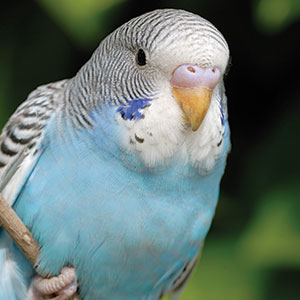
Budgies
Fast Facts
Lifespan: Up to 10 years; perhaps longer with careSize: About 9 inches long
Native to Australia
Endangered Status: Least Concern
General Appearance
The wild budgie is smaller than those that have been breed as pets, measuring between six and seven inches long. Wild budgies are predominantly green, while those in captivity have been selectively breed for over one hundred years to produce varying shades of green, blue, yellow, violet and even slate. A number of pattern mutations exist as well, notably the pied, clearwing and opaline variations.Male and female budgies can be told apart by the color of their cere, which is the area around their nostrils. In males, the cere is blue, and in females it ranges from pale brown to white when not breeding and is a darker brown during breeding season, when it also develops a crusty texture. Immature birds of both sexes have pink ceres.
Budgies Behavior and Personality
Don't let these little guys fool you – they're packing big personalities underneath all those feathers! These social babies love spending quality time with their people, and they need lots of attention, playtime and interaction. If you find yourself in a perpetual time crunch, consider adding a second budgie to your bird family. Both budgies will thank you for the company as long as you provide them with a large cage, fresh food and water, and plenty of stimulating toys. Choose your bird's new friend carefully, though; females can be very territorial, especially toward other female birds. Unless your female has a good history with other female birds or you have an extra-large cage, a male may be a better choice. However, remember that they may breed and have chicks! If you have a male, introducing a second male generally works well. They usually interact amiably, and some even sing to one another.And speaking of singing, budgies are great vocalists! While males often learn far more words than females, both sexes can be trained to whistle, sing and talk. In fact, a budgie was awarded the Guinness World Records' top spot for talking birds in 1995 with a vocabulary of over 1,700 words – one of the highest word counts ever recorded for a bird. Pay careful attention to the sounds your budgie makes; they have high, squeaky voices and speak quickly, so if you're snoozing you might miss it!
Challenges
Budgies need lots of exercise and a balanced diet to stay healthy. They're more likely than other breeds to gain weight, and this weight gain can lead to health problems including fatty livers, tumors, cancers and drastically reduced lifespan. Ensuring your budgie gets enough exercise includes providing him with mentally stimulating toys, foraging opportunities and training or playtime outside the cage. If you have two birds who play together, it's still important to provide supervised, out-of-cage exercise.Correct nutrition is also essential for avoiding these health issues. Many budgies are seed fanatics, and while seeds provide important nutrients, they do not provide a balanced diet because of their high fat content. Supplementing the seeds your budgie loves with pellets, fresh fruits and vegetables and other bird-safe foods will help keep your baby healthy.
Fun Facts
- Budgies are a member of the parakeet family, a non-taxonomical name used to group a variety of small parrots with flat, tapered tails together. They're closely related to lories, lorikeets and Fig parrots.
- Budgies can be great pets for families with children, but remember: these little birds aren't toys! Teaching small children to care for animals can be hugely beneficial, but it's advisable to always provide adult supervision. Budgies aren't as intimidating as some larger birds, but their beaks are still sharp!
- The English show budgie is often exhibited at animal shows, and they're about twice as large as wild budgies.
- Budgies are the third-most kept pet in the United States, after dogs and cats.
Discover More!
My First Bird: What Kind of Bird Should I Get?How to Prevent Boredom in Your Bird
Tracking Your Bird's Weight
How to Switch Your Bird From Seeds to Pellets
Return to Bird Articles


